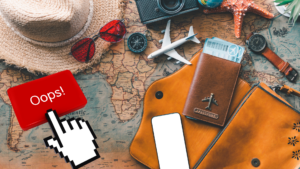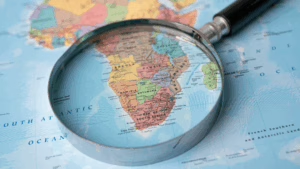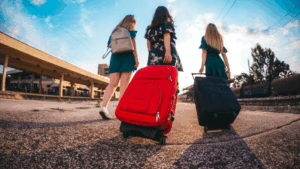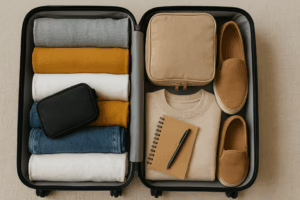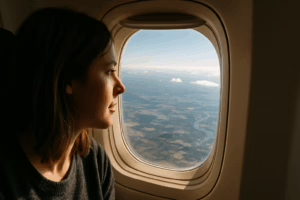Mastering the Art of Booking Wisely
While booking travel is simple, finding the most affordable fares can be complicated. Prices fluctuate, cookies track your activity (unless in incognito), and fees (e.g.seats, checked baggage, etc.) can cause costs to skyrocket. The key to saving money is understanding the best time and platform to book. According to a 2023 study by the Airlines Reporting Corporation, domestic flights are generally cheapest when booked 21 to 60 days in advance, while international flights see the best prices about six months before the departure date.
Comparison tools like Google Flights and Hopper help travelers monitor fare trends and set alerts. However, sometimes the best deals are found directly on airline websites, especially during flash sales. In the past, I booked from travel search engines, but this year, I have started booking direct as it can be cheaper and less complicated, especially pertaining to packages. Clearing your browser cache or using incognito mode as recommended above can also prevent dynamic pricing from pushing up fares based on your repeated searches.
While aggregators like Expedia and Booking.com offer a wide selection, direct booking through a hotel’s site may yield extra perks like free upgrades or breakfast. More independent travelers are also turning to platforms like TrustedHousesitters or HomeExchange, which offer accommodations in exchange for house or pet sitting.
Pack Light, Pack Smart
Packing strategically can transform the entire travel experience. I learned this when I took a trip in Q1 and did not check a bag. It transformed my experience so much that I decided going forward to pack so strategically, I would not need a checked bag. I also saved money and time doing this as there was no checked luggage and my bag did not have to be weighed.
Capsule wardrobes built around versatile, neutral pieces allow you to mix and match outfits with ease. Another tactic is to use compression packing cubes and vacuum-seal bags, which dramatically reduce clothing bulk, keeping items organized. Tech gear can be kept minimal with multipurpose devices and universal chargers.
Many experienced travelers follow the “1-2-3-4-5-6 rule”: one hat, two pairs of shoes, three bottoms, four tops, five pairs of socks, and six pairs of underwear, adjusted to fit the length and type of trip. My strategy is to use dresses, so I can think less about coordinating jewelry and shoes. For the ladies, it is possible to go on a trip for weeks without a checked bag!
Timing Is Everything
The time of day you travel matters just as much as the destination. Early morning flights are less likely to be delayed, according to data from the U.S. Department of Transportation. Airport crowds are also thinner, meaning faster check-ins and shorter security lines.
Booking attractions or activities during off-peak times as this can save time and money. Museums and landmarks often offer discount prices during weekday mornings. Restaurants are less crowded in the afternoon versus dinner. This can lead to a calmer atmosphere all around, including an improved mood of your server.
Even the day of the week you choose to fly can impact costs. Tuesdays and Wednesdays are consistently cheaper than weekends, and traveling outside of major holiday windows can significantly reduce expenses.
Embrace Technology Without Addiction
Technology can be a traveler’s best ally, but knowing which tools to use is essential. Mobile boarding passes, real-time flight tracking apps, and mobile payment systems like Apple Pay or Google Wallet can streamline your journey. Meanwhile, apps like TripIt consolidate travel itineraries and send reminders, while Rome2Rio helps you compare transport modes in unfamiliar cities.
However, over-reliance on technology can backfire. Always carry a printed copy of important documents like hotel reservations, emergency contacts, and your itinerary. In regions where Wi-Fi is scarce or unreliable, offline maps via apps like Maps.me or Google Maps’ download feature are invaluable.
For longer stays or more immersive travel, Google Translate, XE Currency, and WhatsApp are essential tools for communication and budgeting. When using public Wi-Fi, a VPN can help protect sensitive data, especially when accessing banking or email services.
Streamline Airport Experiences
Navigating airports can be one of the most stressful aspects of travel, but a few small adjustments can yield major benefits. TSA PreCheck and Global Entry reduce security screening and customs clearance time significantly. According to the Transportation Security Administration, over 95 percent of TSA PreCheck passengers wait less than five minutes.
Packing your bag with security in mind also makes a difference. Keep electronics and liquids easily accessible, wear slip-on shoes, and avoid belts or jewelry that may trigger metal detectors.
Using lounge access, either through airline status, credit card perks, or single-day passes, can provide a much-needed haven with Wi-Fi, snacks, and comfortable seating. These spaces are not only more pleasant but often quieter and better for productivity if you are traveling for work.
Think Like a Local, Not a Tourist
One of the most overlooked travel hacks is adopting a local mindset. Locals rarely pay tourist prices or fall for travel traps, and travelers can do the same by conducting just a bit of research ahead of time. Avoiding restaurants near major attractions, using public transit, and shopping at local markets can not only save money but enrich your experience.
Free walking tours offered in most major cities can give you insider perspectives while costing little more than a tip. Apps like EatWith or Meetup connect travelers with local hosts for authentic meals or activities. Airbnb Experiences, when vetted carefully, also offer personalized, non-commercial encounters.
Learning a few key phrases in the local language can go a long way. According to travel psychologist Dr. Michael Brein, even simple attempts to communicate in the local language often lead to friendlier interactions and better service.
Insure the Experience, Not Just the Trip
Travel insurance often seems like a luxury until something goes wrong. However, savvy travelers know it is an essential part of smart planning. Comprehensive policies cover more than cancellations. They can reimburse for lost luggage, medical emergencies, and even evacuations.
For example, a survey by Squaremouth found that claims for medical emergencies while traveling have risen in recent years, especially among travelers to remote or less developed regions. Having coverage can turn a crisis into a manageable inconvenience.
When choosing a policy, read the fine print. Some credit cards include travel insurance as a benefit, but coverage limits and exclusions vary. Specialized insurers like World Nomads and Allianz offer customizable plans based on the activities you plan to do, from skiing to scuba diving.
Make Layovers Work for You
Layovers are often viewed as necessary evils, but with a shift in mindset, they can become part of the adventure. Instead of rushing through airports or dreading the downtime, savvy travelers treat layovers as opportunities to explore or recharge. Some cities offer free or low-cost transit passes for layover visitors, such as Singapore or Doha, allowing you to visit major attractions without extra cost.
Even when stuck inside the terminal, there are ways to optimize the time. Airport lounges, wellness areas, and even short-stay hotels inside terminals offer rest and recovery. Many airports now feature art installations, cultural exhibits, and even live music, turning waiting time into enrichment.
If you know a long layover is inevitable, pack accordingly. A change of clothes, portable snacks, and entertainment like books or downloaded movies can make the hours more pleasant. Apps like Loungebuddy and FLIO can also help you discover lounge access and airport amenities you might otherwise overlook.
Use Credit Card Perks Strategically
Many travelers underestimate the full potential of their credit cards. Beyond points accumulation, some cards offer travel perks that can significantly enhance your experience. These include free checked bags, access to priority boarding, and even automatic hotel upgrades. The American Express Platinum card, for example, offers airport lounge access and generous travel credits.
Travel credit cards often provide built-in insurance for trip cancellations, rental car damage, and delayed luggage. Reviewing these policies before purchasing separate coverage can save money and avoid redundant protection. Many cards also waive foreign transaction fees, a benefit that can add up quickly during international travel.
For maximum value, align your spending with reward categories and pay off balances each month to avoid interest. Some travelers use a system of rotating cards based on destination or trip type, allowing them to take advantage of each card’s unique benefits. The key is intentionality: use your card not just for spending but for strategic savings.
TLDR: 12 Smart Travel Hacks
- Book flights and hotels at optimal times and directly for the best perks
- Use incognito mode or clear cache when searching for travel deals
- Create a capsule wardrobe and use packing cubes for efficient luggage
- Fly early and mid-week to avoid delays and reduce ticket costs
- Use travel apps but always have offline backups of key documents
- Enroll in TSA PreCheck or Global Entry to save time at airports
- Travel with a VPN when using public Wi-Fi abroad
- Visit attractions during off-peak hours to save time and money
- Eat like a local and explore authentic experiences
- Carry a universal charger and minimize single-use tech items
- Learn a few local phrases to improve interactions
- Invest in travel insurance tailored to your itinerary
Smarter travel is not about cutting corners. It is about making informed decisions that enhance your experience, protect your peace of mind, and stretch your resources. In a world where travel is both more accessible and more complicated than ever, these strategies help you move through it with confidence and clarity.



